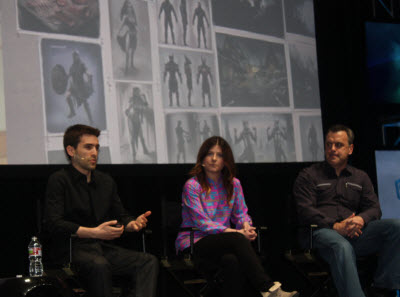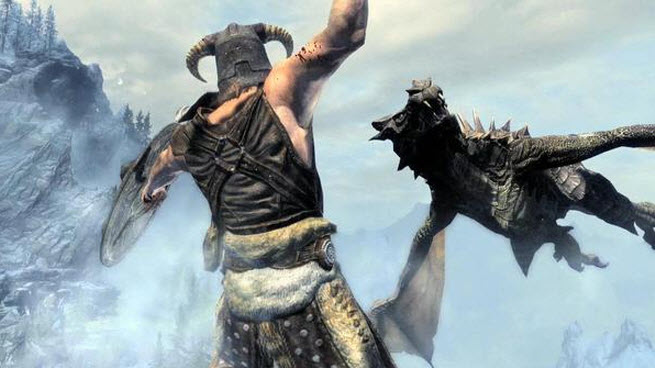The Elder Scrolls V: Skyrim was one of the best-selling video games of the fall, with more than 10 million units shipped in the first month it was on sale. A big part of its success was superior marketing.
For sure, developers make great games. Marketing can’t do much to dress up a pig. But bad marketing can hurt a great game’s sales and outstanding marketing can push it into mass market awareness. Today at the Game Marketing Summit, the marketing team from Bethesda Softworks talked about the behind-the-scenes effort to make Skyrim a mass market hit.
 The conventional wisdom is that fantasy-oriented games are not mass market titles. Role-playing games (RPGs) tend to be so geeky and elaborate that they appeal to small, fanatical audiences, said Pete Hines (pictured right), vice president of marketing and communications at Bethesda Softworks. Ideally, you start with a great game so you don’t have to trick anyone into buying it. Skyrim was a game world of enormous scope and an incredible amount of detail. Some gamers are turned on by that, others turned off.
The conventional wisdom is that fantasy-oriented games are not mass market titles. Role-playing games (RPGs) tend to be so geeky and elaborate that they appeal to small, fanatical audiences, said Pete Hines (pictured right), vice president of marketing and communications at Bethesda Softworks. Ideally, you start with a great game so you don’t have to trick anyone into buying it. Skyrim was a game world of enormous scope and an incredible amount of detail. Some gamers are turned on by that, others turned off.
One key to getting marketing and development to work together is co-location. The developer, Bethesda Game Studios, is in Rockville, Md., and the publisher, Bethesda Softworks, is located downstairs in the same building. AKQA, the digital agency, has an office 15 miles to the south. The team can meet with development chief Todd Howard as needed. Hines and Howard have worked together for 13 years.
“We just walk upstairs and have a chat with Todd,” Hines said.
The team spent six months or so together pulling together ideas before they presented to Howard, who wound up liking many of the marketing proposals, Hines said.
Ed Davis (pictured left), account lead at AKQA, said it was rare for his team to have so much advance knowledge, developer relationships, and immersion in the Skyrim franchise as his people did. They were able to portray the game as a modern, cinematic take on fantasy. It was almost movie-like in its marketing imagery and commercials, Davis said. And that wasn’t lying or cheating.
“We didn’t apologize for what it is,” Hines said. “It is a single-player fantasy game with elves and dwarves. There is a way to present that in a way that is true to the game.”
Erin Losi (pictured middle), a marketer at Bethesda, said the approach wasn’t to give a list of features on the RPG.
“It was about creating a vibe and mood that matches the experiences in the game,” she said.
Davis said, “We wanted to show that detail, from every stitch in the armor, every dent, every scratch” in the game’s marketing materials.
Those materials had to match the game, Losi said, since everyone knew the fans would scrutinize the details in the ads. AKQA created logos that had the dented metal look of the actual emblems and swords in the game. The first trailer had pulse-pounding music and dramatic narration, as well as the dented metal carvings on a wall.
“It was extremely cinematic and exciting for fans,” Davis said. “About 800,000 people who came to the site spent time exploring the details of the wall. Consumers respond to it and respect it.”
The ad material conveyed the realism of the game experience and used the same visual language.
“That level of detail lends itself to the series as a whole,” Hines said.
The first audience marketers should try to sell on a game’s marketing material is the development team itself. If you create marketing materials and the developers start using them, then you know you are on the right track, Hines said.
Lastly, one of the most important things for marketers to remember is to show restraint in their promotion of the game, Davis said. In the first 11 months of the campaign, Bethesda only released three video trailers. Toward the end, they ratcheted it up.
“We wanted to keep people hungry for more content,” Losi said.
Hacker group LulzSec tried to extort the company into releasing more assets. But everything, including the conservative game cover, was based on the idea that less is more — and that gamers are intelligent.
The game turned out to be a big hit. Most people played it for 80 hours, and 30 percent played it for more than 100 hours. It was the No. 2 grossing title of 2011 and was named Game of the Year by a variety of publications.
VentureBeat's mission is to be a digital town square for technical decision-makers to gain knowledge about transformative enterprise technology and transact. Learn More

